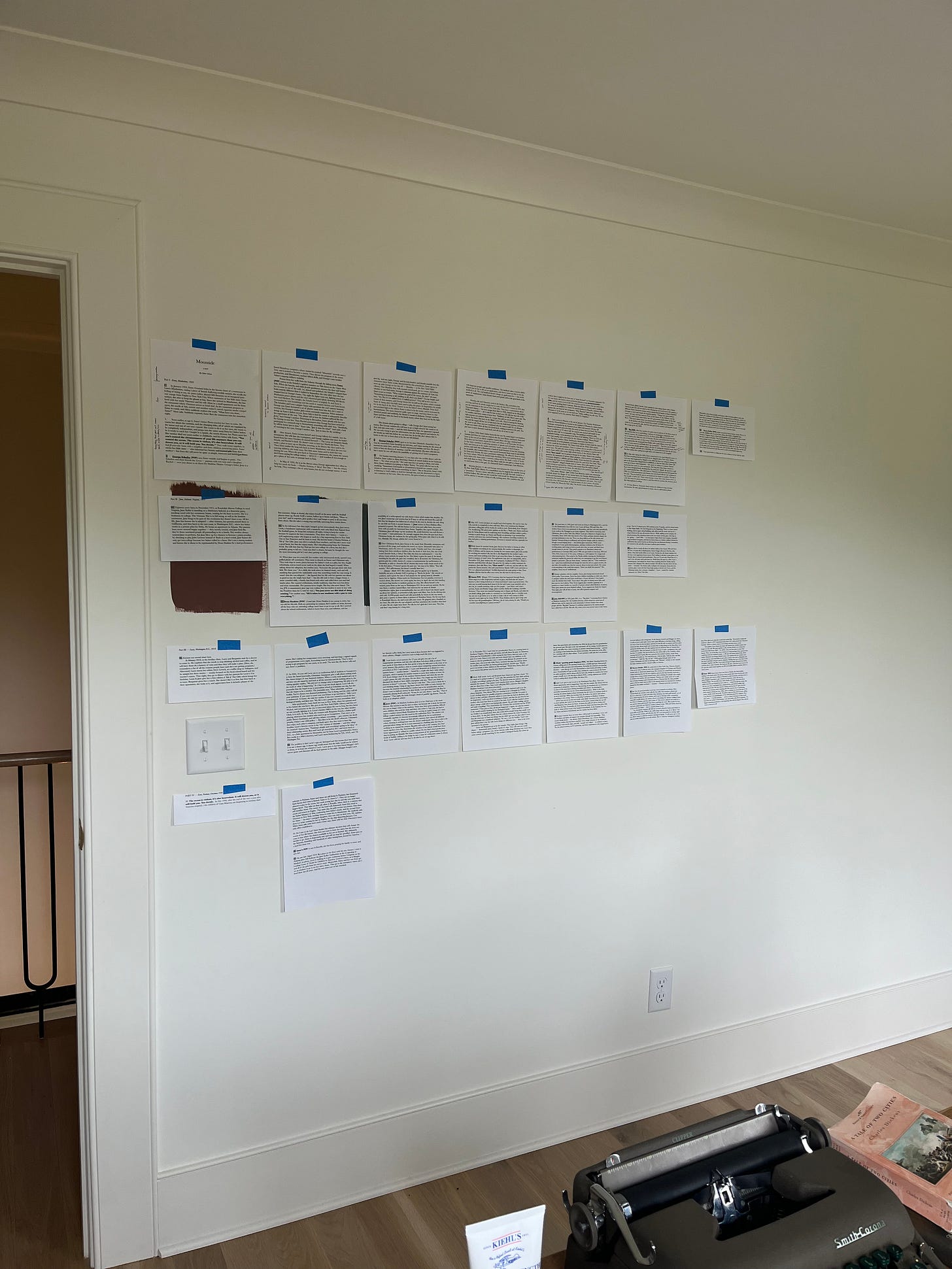Swing the Bat and Pray
Why Jerry Seinfeld's Duke Speech is everything we need right now, plus a glimpse into the novel-editing process.
What if commencement speeches aren’t really for graduates, but for the people in the stands? What if the Sunscreen Song really was the best thing that came out of the 1990s? What if Jerry Seinfeld’s speech, delivered this past Saturday at Duke University, is everything we need right now?
The people who need words of encouragement the most aren't the young people wearing caps and gowns, but the rest of us — people who understand that potential rarely delivers on its promises, and that plans go astray, and that life almost never looks like what you imagine on that day, sitting in the hot sun, under the shade of a flat-billed graduation cap.
I love commencement season and always have. And Jerry Seinfeld’s speech came just in the nick of time. His words are what we all need right now. Especially me.
Headlines will tell you he got boo’ed. That a group of 30 or 40 students walked out on his speech. Why? Is it because he is Jewish? Because he and his wife, Jessica, don’t hide their outrage for what happened in Israel Oct. 7 and their desire for the remaining hostages to be released? Regardless of the reason, the protesters who wanted to interrupt his remarks, only brought more attention to his words — and they are excellent. Chock-full of wisdom and humor.
In the speech, Seinfeld offered his three real keys to life (“no jokes in this part”). (1) Bust your ass, (2) Pay attention, and (3) Fall in love. “Effort always yields a positive value even if the outcome of the effort is absolute failure of the desired result. This is a rule of life. Just swing the bat and pray is not a bad approach to a lot of things.”
I took out my markers and wrote that last bit on an idea card to keep on my desk.
As many of you know, I am currently writing a novel — my second. It has been a long, arduous process, harder than I anticipated, and just as bumpy as writing the first one. Maybe even bumpier. My first novel was based on the true stories of several women graduates of the U.S. Military academy at West Point. This second novel is also based on true stories — but loosely so — and that required far more trust and play on my part to crack open the elements of fiction to make the story have its own internal engine. In other words, it’s really really hard to write a story when you’re essentially in charge of making everything up.
My “process” (vomit) is still in the works, because I’m so very much at the beginning of figuring out how to do any of this. But as far as I can tell, here is how I write a novel.
Gather lots of different ideas.
Pick one.
Write a lot of stuff that is essentially beating around the bush. Try to find an engaging way into the story.
Write a bunch more stuff that will never see the light of day.
Write seventeen scenes. Delete all seventeen.
Start again.
Share these pages with your mom and your writing group.
Start a third time.
Gain some momentum, begin pushing the story forward. Find secondary and tertiary characters. Enjoy this process of finding out new things about these imaginary people. Don’t worry so much. Produce word count, page count. Accumulate essential material.
Begin to worry about structure, as you begin to see that everything you’ve accumulated has none.
Go on a writing retreat to Italy to research setting and history. While there, have your favorite living author (and a dream team of 10 writers) read the opening 20 pages of your novel and give feedback. Return home with a plan.
The plan is to print everything and start over.
Start from page one and write for a year without stopping or looking back. (Keep a very large “cut” document, too, which will eventually have a word count equal to its own novel.)
Print all this out and read it front to back.
Sigh with relief on page 100. Hey, this is not so bad!
Devolve into an utter panic attack at page 200, because it might be very very terrible.
By the end, reach stasis. It’s not terrible, nor is it ready. You knew this, already: more revision is needed.
Write a detailed outline of what you currently have, then revise the outline to reflect what you’d rather the book actually have. (This is Matt Bell’s advice in his book “Refuse to be Done” and it’s a solid piece of advice.)
Begin again.
And that, my friends, is the place I am in right now and where I will be for the next 3 months, as I embark on a *hopefully* final re-write of this novel. And that’s why Jerry Seinfeld’s words hit me straight in the heart, right where I needed to be hit.
He’s one hundred percent right. Swing the bat and pray is not a bad approach. No matter what you’re doing today — whether you’re a mom, trying to understand how to de-escalate a toddler’s incessant tantrum, or you’re a business executive, trying to figure out how to keep a ship from sinking — none of us really know what the heck we’re doing. Whatever we do, we know it may not work. It may fail. But it won't fail because we didn’t try.
Here’s to hard work. Here’s to busting your ass. Here’s to diving back into the work, knowing that, as Jerry Seinfeld says, “all effort produces value, even if it doesn't produce desired results.”
And this summer, if you’re wondering what I’m up to — if you wonder why my newsletter is a bit less frequent — know that I’m buried in these pages, a.k.a. standing at the plate. Here I go.
I’m going to swing the bat and pray.
This is my master outline, on the wall in front of me. The goal is to finish the re-write by the end of the summer.
Recent Favorites
Read: I have had a string of DNF books lately (did not finish) — so right now, I am re-reading A Tale of Two Cities by Charles Dickens. It’s not exactly an easy read, but I’m finding the challenge to be worthwhile. Novelists used to write with total freedom! Books are far more conversational and simple in tone and prose than they used to be. That’s not exactly a bad thing, but Dickens’ rich writing is giving my brain some much-needed exercise.
Purchase: The dress I’m about to recommend to you is a bit more pricey than I’m comfortable with “admitting” I bought, but I only like to buy things that will go the distance (a.k.a. something I’m still going to like in 10-15 years). When it’s good, it’s really good. Brochu Walker Havana Dress // Brochu Walker Havana Mini (I bought the long one. If you live in Nashville, be prepared to see it all summer long.)
Listen/Watch: Jerry Seinfeld’s Duke Commencement Speech. This is required.
“Let go of this idea that you have to find this one great thing that is my passion — my great passion — with your shirt torn open and your heaving pec muscles… it’s embarrassing. Just be willing to do your work as hard as you can with the ability you have… Find fascination. Fascination is way better than passion. It’s not so sweaty.”
— Jerry Seinfeld, Duke University Commencement Speech to the Class of 2024










I really related to this, Claire. I feel like this has been me the past three years working my way to a dyslexia diagnosis with one of my children. And now, it is me with every decision I make regarding how to best educate him as we figure out what works for him and how to do everything. I thought once I knew, then we would be able to progress--but really, as we progress in levels of education, there are new challenges that are presented that we have to figure out. So, I just keep swinging the bat, praying the decisions I make are best for him and not hindering him further.
I just want you to know that I think you are super smart, savvy, sophisticated, beautiful kind and talented. You're doing an amazing job juggling family life and doing a very, very hard thing. I look forward to your next novel. I enjoy watching your career. I feel an odd kinship in that I'm from Greenville, SC. Many of my friends went to Furman. It's a fine school. I enjoy your newsletter/substack. You inspire me.